The reaction to having a woman in a condom ad is exactly why we need women in condom ads.
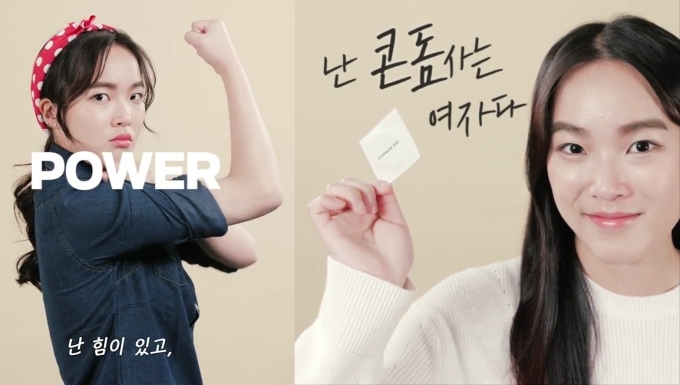 Estimated reading time: 5 minutes. All screenshots via YouTube.
Estimated reading time: 5 minutes. All screenshots via YouTube.
Korea has only ever had three condom commercials on TV since a ban was lifted in 2006, and none at all for the last five years. Korean women generally rely on men to purchase and use condoms too. I wish these realities weren’t true, and am always looking for evidence to show attitudes are changing. Yet they stubbornly persist.
That’s what makes commercials like this one for Common Day condoms so important. Produced for social media in April but only going viral this week, it’s surprisingly sweet, with messages that are simple but powerful. So why is it so disliked?
Here’s my translation of the captions:
난 콘돔사는 여자다.
여자가 콘돔을 어떻게 사냐고?
약국, 편의점, 인터넷, 성인샵에서
‘그냥, 사면 된다.’
I’m a woman who buys condoms.
How can a woman buy condoms you ask?
At pharmacies, convenience stores, over the internet, and at sex shops.
“Just buy them.”
물론 처음엔 쉽지 않았지
내가 콘돔을 사기 전까지
‘여자답지 못하네’
‘여자가 밝히네’
‘그건 남자가 사야지’
Of course, it wasn’t easy at first.
Up until the moment I finally bought them myself, I thought [people would say]:
“That’s not ladylike.”
“Wow, is she oversexed or what.”
“That’s something only men should buy.”
이런 말들과 싸워왔거든
나만 겪어본 건 아닐거야
근데, 지금은 21세기
‘그냥, 사면 된다’
Actually, I struggled with those thoughts too.
I’m sure I’m not the only who felt like this.
And hey, isn’t it the 21st Century now?
“Just buy them.”
현재의 우린 ‘자기결정권’ 이란 게 있어
생각과 말,
몸과 욕망을 스스로 결정할 권리
누가 준 것도 아니고
빼앗을 수도 없는 거야
내가 원래 가지고 태어나는 거거든!
We in the modern age, have the right to decide what’s best for ourselves
That includes rights about our bodies and our desires
This is something that wasn’t given to me, and so can’t be taken away from me.
This is something that we were born with.
예를 들면,
내가 원할 때 섹스하고
원할 때 임신하는 것
뭐 그런 거 말야
남자가 콘돔이 없을까 불안하다고?
그래서 내가 ‘그냥, 사면 된다’
For example,
I can have sex when I want,
and I can get pregnant when I want—
you know, things like that.
So you get concerned and worried when men say they don’t have a condom?
That’s why you should just buy them yourself!
난 19세기 여자가 아니거든!
난 힘이 있고,
욕망이 있으며,
모든 것은 내가 결정해
난 콘돔사는 여자다.
I’m not a woman of the 19th Century!
I am powerful,
and I have desire,
I decide everything for myself,
And I am a woman who buys condoms. (End)
Awesome, right? Yet it has 8 to 1 dislikes to likes on YouTube. Probably, because of trolls like this one below, who replied to the tweet I first found the commercial on. I don’t mean to feed him, but will translate a couple of tweets from his long screed to show what Korean women, condom manufacturers, and sexual-health advocates are up against (I welcome alternate translations; being such a typical troll, he’s not very coherent sorry):
(Source.)
Jeez, this is just such typical BS from a “21st Century woman.” What is it with “women hav[ing] the right to decide what’s best for themselves,” and carrying condoms in case men don’t have them, and choosing for themselves when they want to get pregnant? This isn’t something women should even buy! Men are supposed to buy them! Can’t you make a condom commercial for men instead?
And later, after discovering that the CEO of the promotion company behind the campaign is—wait for it—a man himself:
(Source.)
Ah, now I get it. Your company often provides junk information in its twitter promotions, like you did while selling diet supplements once. In this case, you just make a commercial with commonly-used feminist words thrown in, as you know women will automatically buy anything that says “feminist.”
Sigh. Please head over to YouTube and like the video right now, to encourage more feminist commercials like it. And please share this post and the video too! :)
If you reside in South Korea, you can donate via wire transfer: Turnbull James Edward (Kookmin Bank/국민은행, 563401-01-214324)

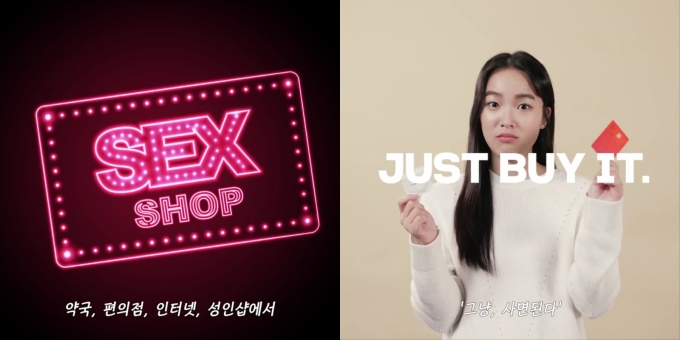
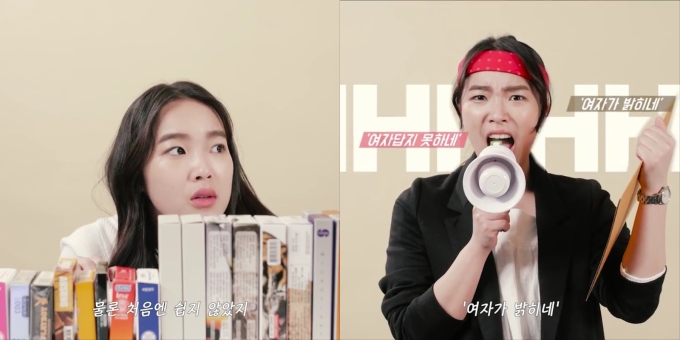
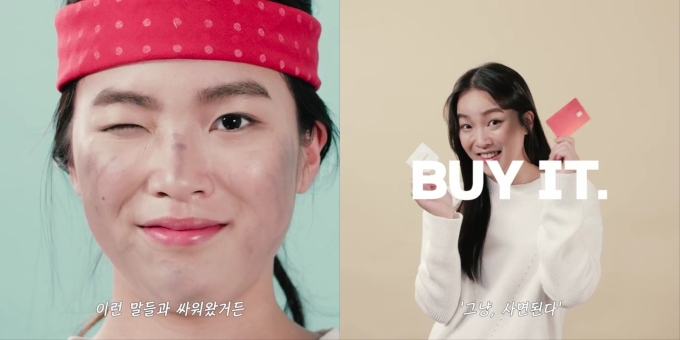
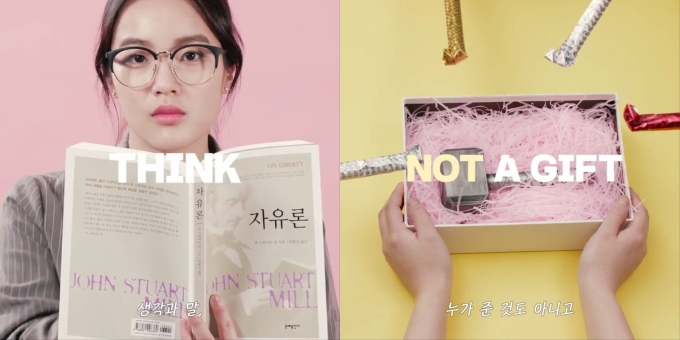
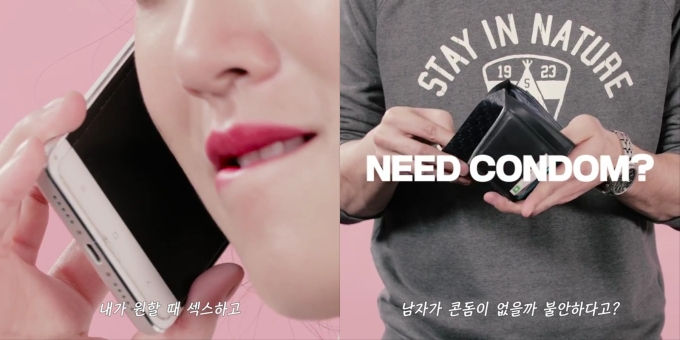
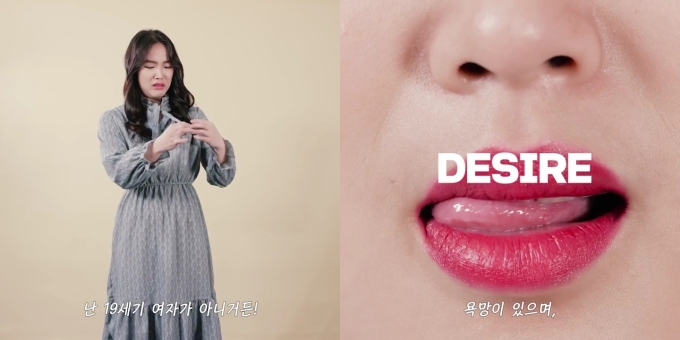
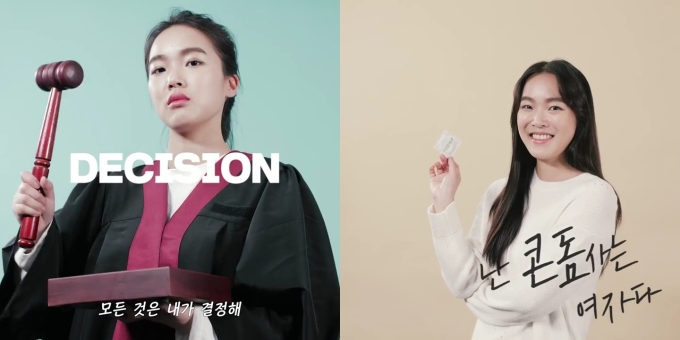
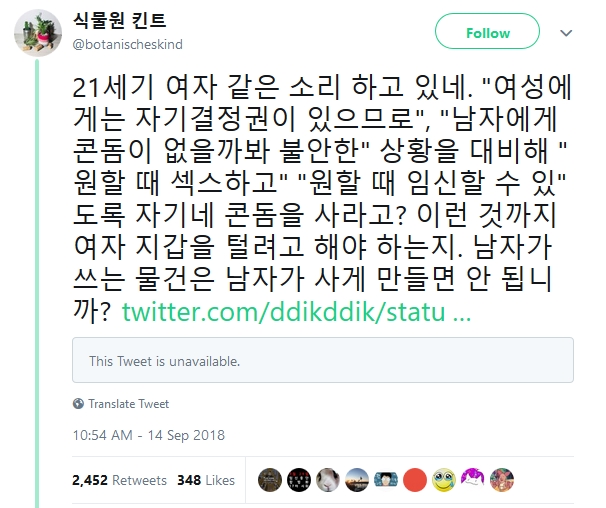
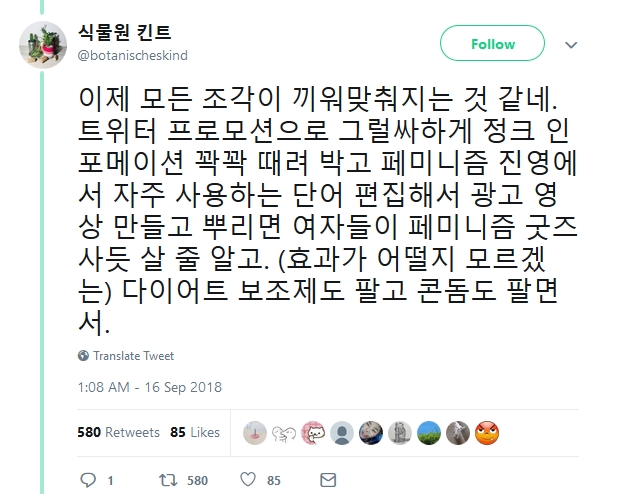

I didn’t expect to see what is obviously Thor’s Hammer from the Marvel movies as an icon of autonomy.
The like-dislike ratio was 1:1 when I got there.
LikeLike
What? Where are you getting this translation? You’re just adding in that tone to fit your own narrative here. He never said “Jeez” and he never said “BS.” You’re just adding your own spin based purely on the fact that he ended the sentence with -네. You could just have accurately translated it as “This is typical 21st century girl talk” or “Typical 21st century woman type speech” but you chose to give it some extra bit of misogyny. His whole comment is reasonable and though it’s clearly his opinion he’s not being aggressive or misogynist like you’re making him sound in English.
I’m curious if you’ll post this comment or just delete it in moderation.
LikeLike
Oh, I quite agree that “This is typical 21st century girl talk” is a more literal translation, and so technically a more accurate one.
But an author’s tone and intent are just as important when translating, and are often lost when done too literally. In that vein, if you can’t detect the condescension in this line of his, as well as in the remainder of the two tweets I translated and in the (untranslated) much longer thread they’re from as a whole, then frankly I’m really not sure what I can do to persuade you that it’s there.
In addition, recall that he explicitly says that he doesn’t think condoms should be advertised to women at all, and that he has an issue with the producer of this commercial being a man.
I’m curious as to if you (or anyone else) can provide any convincing reasons as to why anyone but a misogynist would write such things? And his curious fixation with this utterly harmless commercial?
I couldn’t see any myself. That’s why I felt that conveying his overall tone was more important than a literal translation of every single line, and don’t feel that I’m misrepresenting him at all.
By all means, feel free to continue to disagree. But if you want to raise the narrative and spin I’m supposedly imposing here again though, please note that I would like nothing better than to finally learn after 10 years of investigation that the Korean public is now completely cool with Korean women buying, insisting upon, and using condoms–like I said in the first paragraph. And so, that when I do stumble across a condom commercial featuring women that get lots of dislikes? Then it would be just great to learn that that wasn’t at all because misogynistic men were not cool with women using condoms, but that in fact it was because of some perfectly reasonable issues with the commercial, like its creative demerits, its poor production values, or whatever.
Somehow though, this guy’s issues with this commercial just don’t sound like that. So I don’t think it’s at all biased of me to see misogyny in someone arguing that women shouldn’t buy condoms, nor unreasonable of me to want to get that across to non-Korean speakers who might otherwise miss it if I provided very literal, line-by-line-devoid-of-overall-context translations instead. My bad.
LikeLike
James clearly said he’d welcome alternative translations so there’s no need to get all huffy and puffy.
“an author’s tone and intent are just as important when translating, and are often lost when done too literally” – I wholeheartedly agree. I could (but won’t) write an essay about the fixation of some folks to try and translate Korean verbatim rather than reflecting what was said in a way a native speaker of another language would say it.
LikeLike
Long time reader/fan here~ As a korean male living in Korea, it always troubles me I get weird/dirty looks when I even mention such possibilities to other korean male acquaintances . I await the day my GF can walk in a motel with me and SHE pays at the desk, head held high without feeling any shame or guilt. Sadly, it’s never happened yet.
LikeLike
Thanks for your comment, and sorry that I got side-tracked over the Chuseok break. I very much await that day you describe too, but TBH I’m very surprised and disappointed that it’s not already like that with love hotel owners (assuming you mean your GF does/would get shamed if she pays for herself at the desk; or did you mean internal guilt?). I would have expected people at the coal-face so to speak to have much more no-BS, non-judgmental attitudes to both men and women enjoying sex, especially as their livelihood depends on it.
On the optimistic side though, when I first started writing this blog young/unmarried-looking women would sometimes get shamed at pharmacies when they bought contraceptive pills, but that was becoming increasingly less common even back then, and I think is practically unheard of now; I have no doubt that things will be the same with female patrons of love hotels too. And perhaps much sooner than we’d expect too, as the #MeToo movement is really, really shaking things up here, and I think is leading to a genuine paradigm shift in the way the Korean public views sexuality (and is a much bigger shift than in the US too!). Exciting times!
LikeLike